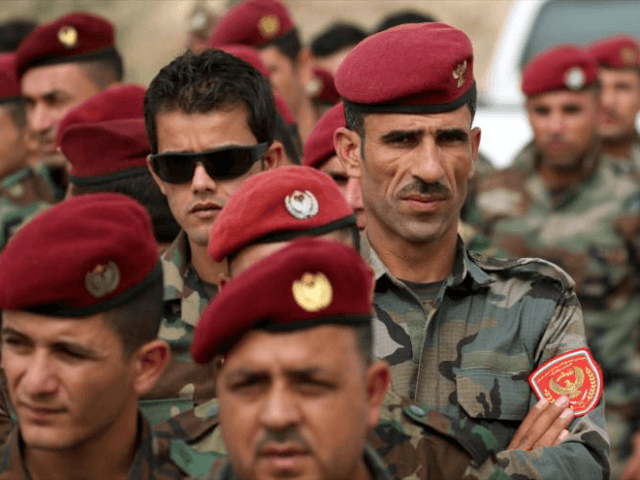The Kurdistan Regional Government (KRG), which voted to secede from Iraq last month, warned on Twitter Wednesday that Erbil had intelligence that the government in Baghdad was planning a “major attack” on its military, the Peshmerga, in the disputed region of Kirkuk.
The KRG blamed Iraqi Prime Minister Haider al-Abadi for any violence that may erupt in the region.
The KRG’s Security Council warned on Twitter that Abadi’s forces may be planning to attack the Peshmerga in Kirkuk:
The PMU is the “Popular Mobilization Units” independent, Iran-backed Shiite militias that the Iranian government legalized prior to the battle to liberate Mosul from the Islamic State. The Kurdish government has expressed concern that Baghdad does not fully control these forces, rendering any promise that they will not attack Kurdish territory doubtful to enforce.
Iraqi Vice President Ayad Allawi has hinted at similar concerns, warning on Monday that a “civil war” may occur if Baghdad does not curb the group. “The government claims they control the [PMU]. If they do they should restrain them, rather than go into a kind of civil war,” Allawi told the Associated Press.
Reuters confirmed with a KRG official that the government’s intelligence has warned them of such an attack. It also received a statement from the government in Baghdad denying that they were planning any sort of siege on Kirkuk. “We are getting ready for the battle in al-Qaim, we’re not concerned by confrontations other than with Daesh [the Islamic State],” an Iraqi military spokesman told Reuters.
The Saudi-based al-Arabiya received a similar rebuttal from a Baghdad government spokesman, saying, “We deny any planning or thinking of an attack in Kirkuk.”
The KRG considers Kirkuk part of its territory since it prevented an Islamic State conquest there—after the Iraqi army —but Iraq insists it does not fall within the traditional parameters of Kurdistan and its mixed Arab, Turkmen, and Kurdish ethnic demographics disqualify it from being part of a greater Kurdistan. Kirkuk boasts vast oil resources that make it desirable for both governments.
Abadi has stated he has no interest in a military clash between the Peshmerga and the Iraqi army. On Tuesday, however, Abadi once again rejected any attempt at dialogue between Erbil and Baghdad and warned the Peshmerga against any “confrontation” with both the Iraqi army and the PMU. The KRG has repeatedly stated the referendum was intended to gauge public support for independence, not declare independence outright, and that Erbil would not secede without dialogue with Baghdad.
The KRG responded to that warning by asserting that “Haider al-Abadi, the prime minister and commander-in-chief of the armed forces is to blame for any disputes or violence which may erupt in disputed areas.”
Following the September 26 referendum, Abadi insisted in a televised statement, “We are not ready to discuss or have a dialogue about the results of the referendum because it is unconstitutional.” This remains the position of the government in Baghdad.
In the KRG statement posted Wednesday, officials tried again. “We invite Haider al-Abadi, again, … (to) any form of dialogue and negotiations in conformity with the Iraqi Constitution,” the statement read.
A clash between the Peshmerga and the Iraqi military would likely result in a Kurdish victory, given the Iraqi military’s lackluster performance against the Islamic State in the past, compared to Peshmerga successes. The Peshmerga have derided the Iraqi military as “too weak” in the past and protested that having to cooperate with them against ISIS has led to slower and less efficient engagement with the enemy.
Perhaps in light of this, Abadi urged the Peshmerga last week to “become[s] a part of the Iraqi national forces, under the Iraqi Federal Government’s command, and to work with our forces to implement Iraq’s authority in all these areas.”

COMMENTS
Please let us know if you're having issues with commenting.